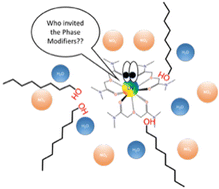Themed collection Metal extraction and recycling

Introduction to the RSC Advances themed collection on metal extraction and recycling
Professor Isabelle Billard, Professor Alexandre Chagnes, Dr Euan Doidge, Professor Jason Love and Professor Magdalena Regel-Rosocka, introduce this RSC Advances themed collection on metal extraction and recycling.

RSC Adv., 2023,13, 33696-33696
https://doi.org/10.1039/D3RA90107F
Novel dithioamide extractant for highly selective separation of Pd from acidic leach liquors of waste auto-catalysts
A novel extractant has been synthesized which can efficiently extract Pd from the leaching liquors of waste auto-catalysts.

RSC Adv., 2024,14, 30971-30981
https://doi.org/10.1039/D4RA05248J
Extraction of Se(IV) and Se(VI) from aqueous HCl solution by using a diamide-containing tertiary amine
A protonated diamide containing tertiary amine (EHBAA) can extract Se(IV) and Se(VI) from HCl via solvation and anion-exchange reactions, respectively.

RSC Adv., 2023,13, 17001-17007
https://doi.org/10.1039/D3RA01341C
Towards electrochemical iridium recycling in acidic media: effect of the presence of organic molecules and chloride ions
Green recycling of iridium made possible with the aid of organic compounds.

RSC Adv., 2023,13, 7980-7987
https://doi.org/10.1039/D2RA07142H
Two-step leaching of spent lithium-ion batteries and effective regeneration of critical metals and graphitic carbon employing hexuronic acid
A comprehensive and environmentally friendly approach for recycling critical metals as well as graphitic carbon from discarded LIBs was proposed. To regenerate pure graphitic carbon a two-step leaching process was adopted.

RSC Adv., 2023,13, 7193-7205
https://doi.org/10.1039/D2RA07926G
Circular economy in hot-dip galvanizing with zinc and iron recovery from spent pickling acids
The management of spent pickling acids (SPA) is an environmental challenge for the hot-dip galvanizing (HDG) industry. We demonstrate at pilot scale the recovery of iron chloride from the SPA of HDG and its reuse at a WWTP facility

RSC Adv., 2023,13, 6481-6489
https://doi.org/10.1039/D2RA08195D
A multi-faceted approach to probe organic phase composition in TODGA systems with 1-alcohol phase modifiers
The effect of varying 1-alcohol alkyl chain length on extraction of lanthanides (Lns), H2O, and H+ was studied with tetraoctyl diglycolamide (TODGA) via solvent extraction coupled with FT-IR investigations.

RSC Adv., 2023,13, 6017-6026
https://doi.org/10.1039/D2RA07786H
Recycling of NdFeB magnets employing oxidation, selective leaching, and iron precipitation in an autoclave
The proposed conceptual flowsheet for high REEs recovery from spent NdFeB magnets.

RSC Adv., 2023,13, 1320-1332
https://doi.org/10.1039/D2RA06883D
Solubility of ammonium metal fluorides in aqueous ethanol mixtures – implications for scandium recovery by antisolvent crystallization
The solubility of ammonium metal fluorides is evaluated in NH4F–ethanol mixtures and the implications for antisolvent crystallization of (NH4)3ScF6 are discussed.

RSC Adv., 2023,13, 1288-1294
https://doi.org/10.1039/D2RA07516D
Production of rare earth element oxide powders by solution combustion: a new approach for recycling of NdFeB magnets
A promising flowsheet is proposed for REEs recovery from NdFeB magnets, as follows: (1) acid baking, (2) employment of ultrasound-assisted water leaching, (3) the production of rare earth oxides (RE oxides) by a solution combustion method, and (4) a calcination process.

RSC Adv., 2022,12, 31478-31488
https://doi.org/10.1039/D2RA05876F
Harnessing magnetic fields for rare-earth complex crystallization–separations in aqueous solutions
Magnetic crystallization was used as an energy-efficient technique for selective separation of paramagnetic rare-earth ions from lanthanum ions. An air-stable and simple RE-DOTA complex system was used to achieve separation in aqueous conditions.

RSC Adv., 2022,12, 27895-27898
https://doi.org/10.1039/D2RA04729B
Removal of hexavalent chromium ions using micellar modified adsorbent: isothermal and kinetic investigations
In this investigation, anionic sodium dodecyl (SDS) and cationic cetyltrimethylammonium bromide (CTAB) surfactants were separately applied to locally accessible wheat bran to remove chromium(VI).

RSC Adv., 2022,12, 23898-23911
https://doi.org/10.1039/D2RA03906K